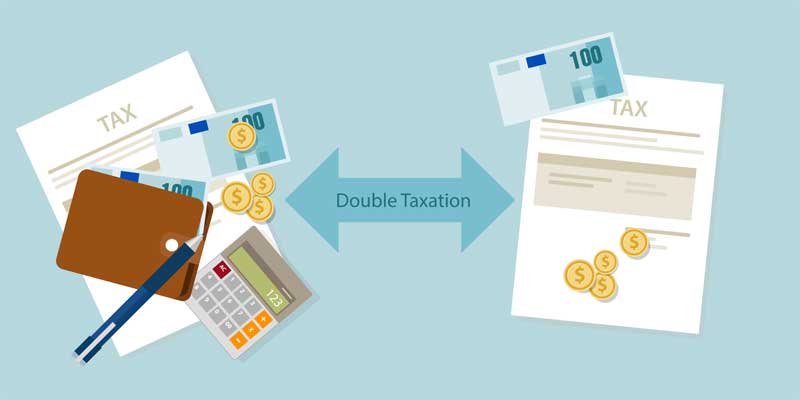Say you’re starting a new business. You’ve come up with a catchy name, perfected the products or services you’ll be selling, and launched your website or social media account. These are all critical steps, but have you thought about which corporate business structure you’ll choose?
Most common options include a sole proprietorship, LLC, S corporation, or C corporation. Each business structure has different tax implications, but C corps are prone to double taxation.
Wondering what is double taxation and how to work around it?

What Is Double Taxation?
Double taxation is paying taxes twice on the same source of income. There are several scenarios where double taxation can occur – and one of them is when a business is organized as a C corp.
A C corp is a separate legal entity that’s distinct from its owners. Corporations maintain many of the same rights individuals possess. They can enter contracts, sue or be sued, own assets, and they’re also responsible for paying taxes.
C corps pay corporate taxes on the profits they generate. Afterward, the remaining after-tax income is distributed to shareholders and employees, who then have to pay personal income taxes on their earnings from the C corp.
Say for example you own a C corp that generates $100,000 in gross income this year. The 2021 corporate tax rate is 21%, which means the C corp will have to shell out $21,000 before it can begin to pay out dividends or income.
Shareholders and employees are entitled to the remaining $79,000. However, they’ll need to pay personal taxes on any income or dividends they receive from the corporation. In this way, the gross income the C corp generates is taxed twice – once for corporate taxes and once for personal taxes.
Double taxation can be an enormous burden. Many business owners are discouraged from establishing a C corp for exactly this reason. The good news is that there are ways you can avoid double taxation.
How to Make Sure You’re Not Taxed Twice
If you own a C corp and don’t want to pay both business taxes and personal taxes on the same source of income, there are strategies that can help. You may be able to significantly reduce or even eliminate the double tax burden.
Retain corporate earnings: C corps that don’t distribute profits as dividends or income are only taxed at the corporate tax rate. That’s because shareholders and employers aren’t claiming any income from the C corp, and therefore aren’t paying personal taxes. This strategy works best if you’re able to forgo income in order to reinvest the funds into growing your business.
Pay salaries instead of dividends: Switching payment to salaries or bonuses instead of dividends can help businesses avoid double taxation. That’s because employee salaries are considered deductible expenses for C corps, but dividends aren’t.
Split income: This strategy splits corporate profit to take advantage of income tax brackets. It involves withdrawing enough salary to only support your lifestyle while reinvesting the remaining profits back into the business. The end result is lower personal gross income and lower business taxable income.
Separate LLC: Some business owners will establish an LLC that purchases equipment or real estate and leases it to the C corp. Cash flow comes through the LLC and the C corp receives a dedication for making payments.
No business owner wants to pay more taxes than they need to. Even though double taxation is a burden, there are ways to get around it. Make sure to incorporate the strategies outlined above and consult with a professional accountant or advisor when tax season rolls around.
If you receive a tax bill you haven’t prepared for and find yourself struggling to come up with enough cash, a business line of credit can help. Business lines of credit offer access to a reservoir of funds you can use to cover cash flow disruptions, unanticipated expenses, and take on new avenues for growth.
At National, we make it easy for businesses to get funding – fast. Talk to one of our expert Business Financing Advisors about personalized financing solutions. Apply now!
Disclaimer: The information and insights in this article are provided for informational purposes only, and do not constitute financial, legal, tax, business or personal advice from National Business Capital and the author. Do not rely on this information as advice and please consult with your financial advisor, accountant and/or attorney before making any decisions. If you rely solely on this information it is at your own risk. The information is true and accurate to the best of our knowledge, but there may be errors, omissions, or mistakes.




